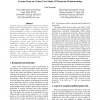Free Online Productivity Tools
i2Speak
i2Symbol
i2OCR
iTex2Img
iWeb2Print
iWeb2Shot
i2Type
iPdf2Split
iPdf2Merge
i2Bopomofo
i2Arabic
i2Style
i2Image
i2PDF
iLatex2Rtf
Sci2ools
HICSS
2002
IEEE
2002
IEEE
Group Cohesiveness and Extrinsic Motivation in Virtual Groups: Lessons from an Action Case Study of Electronic Brainstorming
One form of group support system that has received much attention from cross-disciplinary research is electronic brainstorming (EBS). While it is generally held that group cohesiveness is lower in virtual settings that in face-to-face interactions, it has also been argued that this does not matter in cognitive work such as idea generation. However, most work on EBS has been carried out in academic settings, and though such environments provide more control, they may be insufficient to capture all nuances of on-going office work. Hence, I describe an action case study of a failing attempt to introduce an EBS prototype in an organisational setting. The analysis suggests that virtual groups, counter to what is previously thought, need to establish and maintain a group identity. One circumstance under which this seems to be the case is in the existence of extrinsic rewards mechanisms.
| Added | 14 Jul 2010 |
| Updated | 14 Jul 2010 |
| Type | Conference |
| Year | 2002 |
| Where | HICSS |
| Authors | Dick Stenmark |
Comments (0)

